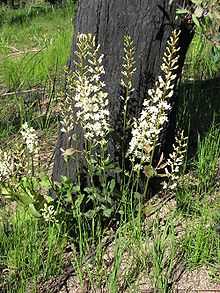Lomatia ilicifolia
From Wikipedia, the free encyclopedia
| Lomatia ilicifolia | |
|---|---|
 | |
| A plant in flower following a fire in Bunyip State Park in Victoria | |
| Scientific classification | |
| Kingdom: | Plantae |
| (unranked): | Angiosperms |
| (unranked): | Eudicots |
| Order: | Proteales |
| Family: | Proteaceae |
| Genus: | Lomatia |
| Species: | L. ilicifolia |
| Binomial name | |
| Lomatia ilicifolia R.Br. | |
| Synonyms | |
|
Embothrium ilicifolium (R.Br.) Poir. Tricondylus ilicifolius (R.Br.) Kuntze nom. rej. | |
Lomatia ilicifolia, commonly known as holly lomatia or native holly, is a shrub species that is native to eastern Australia.[1][2] The species grows up to 3 metres high and has ovate to elliptic, prickly leaves that are 10 to 18 cm long and 2.5 to 5.5 centimetres wide.[2] The white to cream terminal conflorescences appear between November and February, most profusely following fire. Follicles, which develop about 3 months later, later are up to 4 cm long.[1] [2]
The species occurs in both montane and low-lying areas from the Otway Ranges in southern Victoria, eastward to Gippsland and northward to the Southern Highlands of New South Wales.[2]
References
- ↑ 1.0 1.1 "Lomatia ilicifolia". Flora of Australia Online. Australian Biological Resources Study, Canberra. Retrieved 2010-07-30.
- ↑ 2.0 2.1 2.2 2.3 Harden, G.J. "Lomatia ilicifolia". PlantNET - New South Wales Flora Online. Royal Botanic Gardens & Domain Trust, Sydney Australia. Retrieved 2010-07-30.
This article is issued from Wikipedia. The text is available under the Creative Commons Attribution/Share Alike; additional terms may apply for the media files.